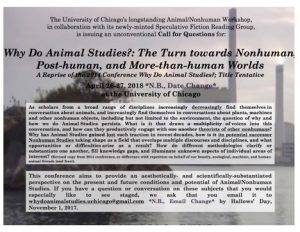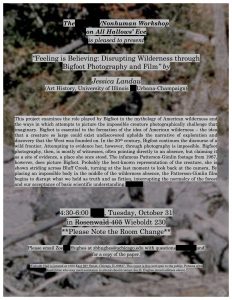(Click flyer to enlarge)
Animal/Nonhuman Workshop
University of Chicago
Category: Uncategorized (page 2 of 8)
The Animal/Nonhuman Workshop requests your presence at a roundtable discussion of “Primitivism: Anarchy, Politics, and the State of Nature,” Against Ecological Sovereignty by Mick Smith (Associate Professor of Philosophy, Queen’s University)
4:30-6:00 p.m., Tuesday, September 26 in Rosenwald 405 Wieboldt 230 **Please Note the Room Change**
Drinks and light food will be served. Please email Zoe B. Hughes at zbhughes@uchicago.edu with questions/concerns and for a copy of the reading.
Wieboldt Hall is located at 1050 East 59th Street, Chicago, IL 60637. This event is free and open to the public. Persons with disabilities who may need assistance to attend should contact Zoe B. Hughes (email address above).
Sept. 26. Orienting Discussion: “Primitivism: Anarchy, Politics, and the State of Nature,” Mick Smith (Associate Professor of Philosophy, Queen’s University)
Oct. 3. “Nonhuman Footnotes to A General Theory of Visual Culture: The Aesthetic Work of Bowerbirds, Brittlestars, and Japanese Pufferfish,” Luke Fidler (Art History, University of Chicago)
Oct. 17. “Albion Mill and the 18th-Century London Geography of Revolt: Coal, Steam, and Architecture for the Anthropocene,” Jacob Henry Leveton (Art History, Northwestern)
Oct. 31. “Feeling Is Believing: Disrupting Wilderness through Photography and Film,” Jessica Landau (Art History, University of Illinois)
Nov. 14. “Setting Loose the Libido of the Puppet: Sophie Taeuber’s Critique of Psychoanalysis,” Marissa Fenley (English, University of Chicago)
Nov. 28. “Cosmic Realism,” Kate Marshall (Associate Professor of English, Notre Dame)
N.B.: All meetings will take place 4:30-6 p.m. in Wieboldt 230 unless otherwise indicated. Wieboldt Hall is located at 1050 East 59th Street, Chicago, IL 60637. This event is free and open to the public. Persons with disabilities who may need assistance to attend should contact Zoe B. Hughes at zbhughes@uchicago.edu.
How, and to what effect, does the nonhuman frame the human?
The University of Chicago’s longstanding Animal Studies Workshop is currently soliciting papers on animals, plants, machines, and other groups on the fringes of humanity. If your work interrogates the conceptual boundaries between the human and any or all of the above, the Animal/Nonhuman Workshop invites you to participate in this year’s cycle of presentations and papers. In the past, our workshop has been attended by students and faculty members from across the humanities and humanistic social sciences, providing a much-needed discussion forum for animal-, plant-, machine-, and object-oriented classicists, literary and film scholars, philosophers, historians, anthropologists, and economists, among others. The problem of the nonhuman, which requires a broad and deep knowledge, all but demands the transgression of conventional areas of study. Working together, the members of our workshop explore cross-disciplinary subjects, including but not limited to:
– Representations of nonhumans in literature, film, and visual art
– Human supremacy (or lack thereof); alterity, real or imagined
– The status, and subsequently, treatment of the nonhuman in disparate regions, time periods, and religions
– The boundaries of the moral community; the ethics of vegetarianism, veganism
– Animality and “becomings-animal”; dehumanization and intersectionality
– Hierarchies of nonhumans; the figure or status of the hybrid or monster
– The ways humanity has been/is being transformed by rapid technological advancement; the pros and cons of human enhancement
– The Anthropocene; Environmentalism and Anti-environmentalism
– The value of diversity; the threat and reality of extinction and responses thereto
– Agriculture and animal husbandry; domestication in theory and practice
– Human and nonhuman spaces; the ethics of zoos and aquariums
– Humanism, Posthumanism, Transhumanism, Antihumanism, and New Materialism
We also welcome submissions on the future of Animal/Nonhuman Studies: given that ours is a nascent area of study and there is a group of researchers that attends our workshop every other week, we are in the exciting position not only to forge solutions to animal/nonhuman problems, but also to contribute to the metadiscourse about our subfield.
If you want to help us develop a unique, institutional voice on issues concerning animals and other nonhumans, or you have an idea – or a paper or chapter – about the role of the fox in medieval French literature or the drone in American consciousness, we ask that you submit a 250 to 500-word abstract to zbhughes@uchicago.edu by December 31, 2018.
James L. Hevia, Department of History, University of Chicago
“Surra and the Emergence of Tropical Veterinary Medicine in Colonial India”

Between 1880 and the first decade of the twentieth century, veterinary medicine in India underwent a profound change. Emphasis shifted from the treatment of diseases affecting domestic animals, such as rinderpest. The new focus was on diseases that threatened to undermine a centerpiece of the British imperial security regime, pack animal transport – built, as it was, around camel, mule, donkey, and pony laborers. At the forefront of such concerns was surra, a blood disease caused by a parasite in the trypanosome family. In addition to attacking cavalry horses, it was the single main cause of death among the animals in army transport.
This paper explores the process by which veterinary medicine became militarized, and transformed by germ theory and bacteriology. It will also demonstrate how events in India were explicitly linked to the emerging field of tropical veterinary medicine, bringing Indian army veterinary surgeons into dialogues with counterparts in colonial Southeast Asia and in French and German colonies in Africa.
Please email Katharine Mershon (kpflaum@uchicago.edu) for a copy of the paper.
Light refreshments will be served.
This event is free and open to the public. Persons with disabilities who may need assistance to attend should contact Katharine Mershon (kpflaum@uchicago.edu).
© 2025 Animal/Nonhuman Workshop
Theme by Anders Noren — Up ↑






Recent Comments